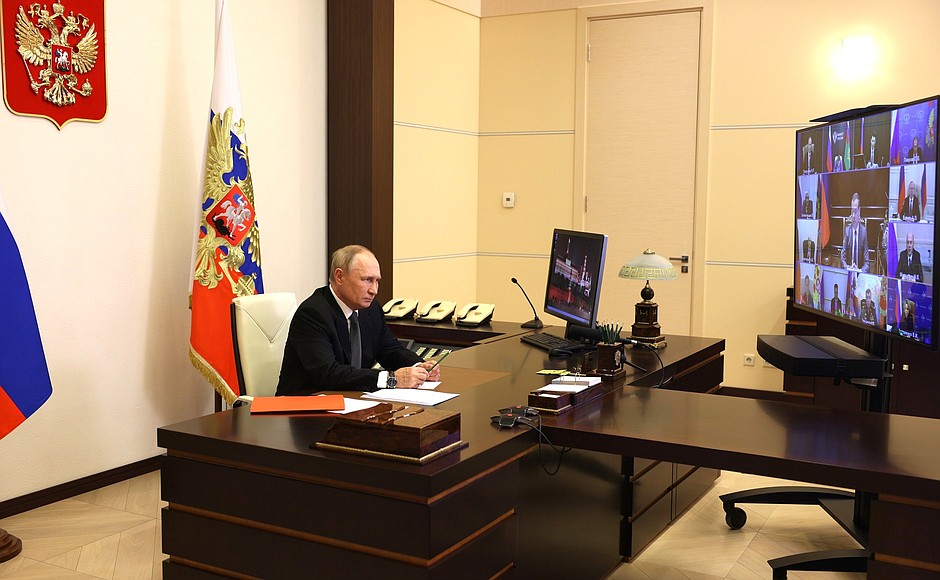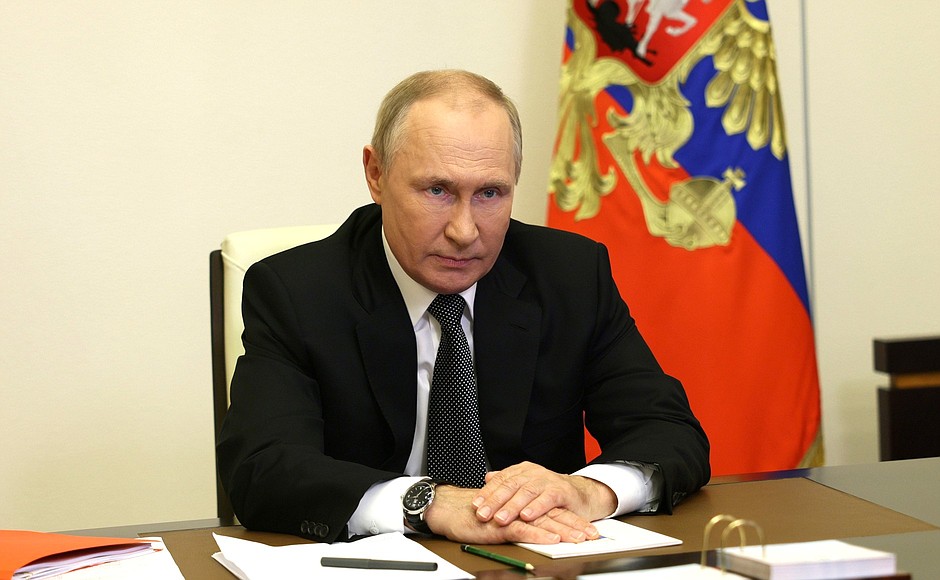President of Russia Vladimir Putin: Good afternoon, colleagues,
Before we proceed to the current agenda, I would like to speak about an exceptionally important matter.
During the referendum, residents of the Donetsk and Lugansk people’s republics, the Zaporozhye and Kherson regions firmly and conclusively expressed their will. They want to be with Russia. The constitutional laws on incorporating these four new regions into the Russian Federation have taken effect.
See also
As we know, the Kiev regime refused to recognise the will and choice of the people, declining any proposals for talks. On the contrary, shelling continues and civilians continue to die. The neo-Nazis are using plainly terrorist methods, plotting sabotage at critical infrastructure, attempting to murder members of local authorities. Just like their ideological predecessors – Bandera's followers and Hitler's accomplices, they are trying to create a criminal underworld, sending sabotage groups to our territories.
The Ukrainian intelligence services plotted the explosion on the Crimean Bridge. We managed to prevent terrorist attacks in other Russian regions, specifically, at mass gatherings, on public transport, at energy facilities, including – and I want to stress this – at nuclear energy facilities.
In this context, I would like to remind you that before their accession to Russia, martial law was in effect in the Donetsk People’s Republic, the Lugansk People’s Republic, the Kherson and Zaporozhye regions. Now we must introduce the same mode under Russian law. This is why I have signed the Executive Order introducing martial law in these four regions. It will be submitted to the Federation Council for approval immediately. The State Duma has been informed about this decision.
Also, I consider it necessary in the current circumstances to give additional powers to the heads of all Russian regions. An Executive Order to this effect was signed today as well.
Top officials in the constituent entities of the Russian Federation should see to it that measures are taken to ensure the safety of people, the security and counterterrorism protection of critical infrastructure facilities, maintain public order, enhance the stability of the economy and industry, as well as launch and increase the manufacturing of products necessary for the special military operation. The regional heads will be authorised to establish corresponding headquarters to coordinate these efforts. I hereby instruct the Government, the Defence Ministry and other agencies to give them all the support necessary.
It is obvious that the situation and state of affairs differ from region to region, and so the range of measures and the tasks set for the regional heads will differ depending on the situation in any given constituent entity of the Federation. Therefore, the Executive Order provides for several levels of response to arising risks.
I am asking the Moscow Mayor, who heads the State Council Commission on State and Municipal Government, working jointly with the Presidential Executive Office, to take part in ensuring coordination of the regions’ efforts to implement the measures set out in this Executive Order and interaction between the constituent entities of the Federation with federal authorities. I hereby instruct the heads of all Russian regions to immediately start implementing the provisions of this Executive Order.
Additional
Next, not only the security and law enforcement agencies concerned but the entire system of public administration shall take part in providing supplies for the special military operation. Work must continue to improve coordination. In this connection, the Government is to draft a Presidential Executive Order on establishing a special coordinating council. It will be chaired by the Prime Minister and will comprise deputy prime ministers and representatives of security and law enforcement agencies, the social and economic bloc of the Government, the Presidential Executive Office and the State Council, which will ensure close interaction with all Russian regions.
I would like to emphasise once again that we are proud of everyone who joins our armed forces and who is doing their duty to defend the Motherland. All our soldiers, no matter what tasks they are assigned, must be provided with everything they may need. This concerns the equipment of barracks and deployment areas, living conditions, uniforms, weapons, meals and medical services. We have the necessary capabilities to deal with all arising questions, which do exist, at a modern level worthy of our country.
It is also known that problems with paying allowances to servicemen drafted as part of the partial mobilisation have emerged in recent time. Today, I have signed an instruction on strict compliance with the established timeframes for and amounts of payments. Let me remind you that they should amount to no less than 195,000 rubles per calendar month, including, I want to stress this in particular, the period of training and instruction.
I also authorise heads of regions, jointly with the Russian Popular Front, the #WeAreTogether movement and volunteers, to take control of efforts to provide all-out support to families whose relatives have been mobilised for military service – to children, parents, wives and the next of kin of all our defenders.
Colleagues,
See also
We are working to resolve highly complicated, large-scale challenges related to ensuring the security and reliable future of Russia. We are working to defend our people. Those who are now at the front or undergoing training at training grounds and centres should feel our support and know that they are backed by a huge and great country, by a united and closely-knit people. I am confident that our workers, engineers and entrepreneurs will continue to effectively address the tasks facing the defence industry and the economy.
Let me stress once again: good organisation is required today at all levels of power. The heads of regions, who have been vested with additional powers, are charged with special responsibility. All heads of constituent entities of the Russian Federation must take concerted efforts and be ready to make quick and precise decisions. It is necessary to be constantly in contact with people, enterprises, labour collectives.
We will work hard, steadily and smoothly. But we also need additional coordination and concentration of efforts in the most important, priority sectors. This is imperative. And we will do it. I count on your support.
Colleagues,
We will now move on to the Security Council’s agenda and discuss certain issues related to the migration policy. This sphere is highly sensitive for national security and for the stable development of Russia and our society.
The situation in the world is changing dynamically. There are new global and regional factors that affect the migration sphere, and we should respond to these factors in a timely and effective manner, improving our work based on a thorough analysis of the new realities.
It is obvious, for example, that we need to upgrade the existing State Migration Policy Concept. It should fully take into account the entire range of both existing and potential challenges and become the basis for further legislative improvements. I issued the relevant instruction in March 2020, and today I expect to hear detailed reports on what has been done and what priorities we will have to focus on in the near future.
Let us move on to the discussion. The floor goes to Deputy Chairman of the Security Council Dmitry Medvedev.
<…>

